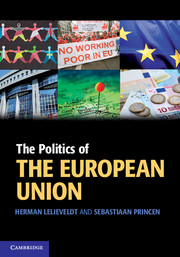Book contents
- Frontmatter
- Contents
- Acknowledgements
- List of briefings
- List of fact files
- List of controversies
- List of tables
- List of figures
- List of abbreviations and acronyms
- List of country abbreviations used in tables and figures
- Preface
- PART I Setting the scene: origins, analytical perspectives and institutions
- 1 The historical development of the EU
- 2 Analysing the EU
- 3 The institutional framework
- 4 Legislation and decision-making: putting the institutional puzzle together
- PART II Key actors in EU politics: citizens, interest groups and political parties
- Part III EU policies: agenda-setting, decision-making and implementation
- Conclusions and reflections
- Key terms and concepts
- Index
2 - Analysing the EU
from PART I - Setting the scene: origins, analytical perspectives and institutions
- Frontmatter
- Contents
- Acknowledgements
- List of briefings
- List of fact files
- List of controversies
- List of tables
- List of figures
- List of abbreviations and acronyms
- List of country abbreviations used in tables and figures
- Preface
- PART I Setting the scene: origins, analytical perspectives and institutions
- 1 The historical development of the EU
- 2 Analysing the EU
- 3 The institutional framework
- 4 Legislation and decision-making: putting the institutional puzzle together
- PART II Key actors in EU politics: citizens, interest groups and political parties
- Part III EU policies: agenda-setting, decision-making and implementation
- Conclusions and reflections
- Key terms and concepts
- Index
Summary
Introduction
Defining what kind of organization the European Union is has always been a challenge. In fact even those people who worked in its heart have had great difficulty pinpointing its essence. Jean Monnet, the first President of the High Authority, called the European Coal and Steel Community ‘a new political form’. Given the nascent status of European integration in those days we could forgive him for being so vague. Three decades later, Jacques Delors, a two-term President of the European Commission, could do no better, describing the European Community as a UPO, an unidentified political object. After sixty years, the President of the Commission, José Barroso, was only a little more precise, when he characterized the EU as a ‘non-imperial empire’. Barroso's remarks made immediate headlines in the Eurosceptic British press which felt that finally the real purpose of the EU had been revealed: to rob the member states of their sovereignty and transfer all powers to Brussels. His fellow commissioner Margot Wallström tried to limit the damage by giving yet another description. In her view the EU should be regarded as a football club: a ‘Citizens United’ that brings the people of Europe together.
There is probably a very simple explanation for these rather vague and disappointing definitions. Trying to capture the EU in a single definition is simply impossible if one does not know what exactly one wants to say about it.
- Type
- Chapter
- Information
- The Politics of the European Union , pp. 31 - 50Publisher: Cambridge University PressPrint publication year: 2011



